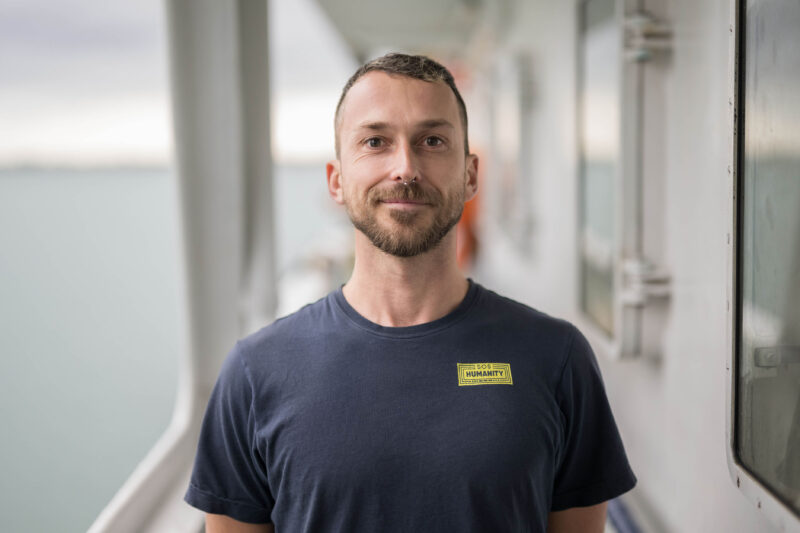Queerness and Civil Search and Rescue

Patrick (he/him or they/them) is part of the permanent marine crew of the rescue ship Humanity 1. He works as an able seafarer (AB) on board and has been working with SOS Humanity since July 2022. Motivated to establish more support and solidarity for queer survivors on board, Patrick offered to take the role of a focal point for our organisation in order to build new structures of support for queer people on board: both survivors and crew members.
What was your motivation to get involved with civil search and rescue?
I have a seafaring background and several years ago I was at sea in the Mediterranean. I was quite alarmed as to why there were so many distress calls. I started researching the situation and decided that I would like to see if my seafaring skills could be supportive for the cause.
And what motivated you to deal specifically with the challenges faced by queer survivors?
In this environment at sea, we are in solidarity with each other. As a queer person myself, I wanted to work towards developing better support for queer crew and survivors. It feels like a holistic approach to be in solidarity with all people on the move.

What role does sexual orientation and gender identity play for people before, during and after their flight from your point of view?
There are many countries where queer people are criminalized. In 2024, there are still 63 countries around the world that formally criminalise LGBTQIA+ people to some extent in their national legislation. There are some countries where it is even criminalised to express solidarity or speak openly about LGBTQIA+ issues or rights. And a lot of the countries that we see people coming from on board the ship fall into this category. As a result, there can be violence, whether that is state violence, through family or even in the street. These are threats that can really affect someone’s life. With that can come social isolation which can have detrimental effects on mental health. So, there is a myriad of reasons why people might want to make a move to somewhere new.
Afterwards, it is the same thing. Say someone arrives in Europe, and they can formally claim asylum based off their gender identity or sexual orientation – it does not necessarily mean that life is then going to be smooth. We are aware that in Western countries, we still have a ton of progress to make for queer people. Maybe people do not speak the same language. Maybe they are in a reception centre that is quite isolated in a small town, and then there just isn’t any support for people.
Are there special needs for queer people on board?
We do a protection speech on board for the survivors between the rescue and when they are disembarked. The protection officer tries to emphasize that LGBTQIA+ identities are a reason to be able to claim asylum in Europe.
Within the crew, we are having conversations and are making progress:
So, in the past we have had open dialogues, and we started to discuss in what ways all these things affect us on board – in relation with FLINTA* (women, lesbians, intersex, non-binary, trans and agender) identities as well, because I think it affects essentially everyone who falls outside of a hetero masculine, cis-male perspective. We need to find structures and ways to support and empower those people to be in positions of leadership, to feel safe, to have open identities. But I think we are doing well given the time and resources we have.
Amongst survivors, it is not so clear. One of the main things is just making sure that we can provide enough information and resources for people in an accessible, but anonymous way.

I know, even growing up in a “progressive” Canadian society it took me a very long time to be able to feel comfortable with myself and to understand the ways that this identity forms my life. So it would be a tall order to expect someone very quickly to just say: “Okay, yeah, this is who I am. And now I will carry on with that future.” Likewise, it is challenging to find ways to support. We are thinking of different ways to distribute information or provide a safe space. We will soon have conversations with some organisations and people on shore to find ways that we can better support people. At the same time, it would be important to establish a network of connections with onshore organisations so that we have follow-on supports for queer survivors.
What are your wishes or demands to politicians with regard to civil search and rescue and the protection of queer people on the move?
Closed borders are violent and the criminalisation of people on the move, whether they are LGBTQIA+ or not, is just clearly a strategy that is not working – it just reproduces cycles of violence. I would call on politicians to stop criminalising people on the move and start pushing for safe migration routes, safe support networks.
My goal as an individual, but working with an organisation where we can effect some change, is to move towards a future where all people, including queer people, are liberated. And that idea is driving us to find ways that we can change our work on the ship to impact, even just a little bit, the future of people and the safety and solidarity of people on the move.
This interview was conducted online by employees of the office with the crew member Patrick.


